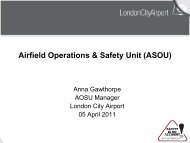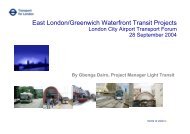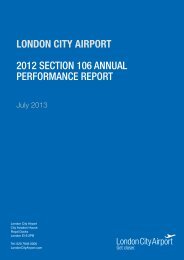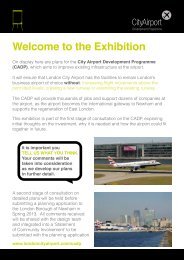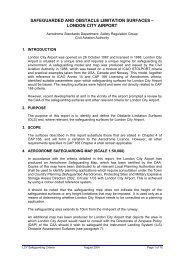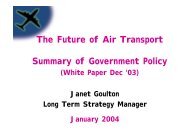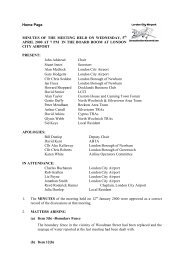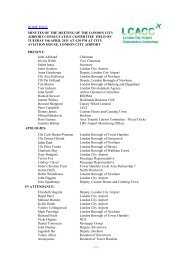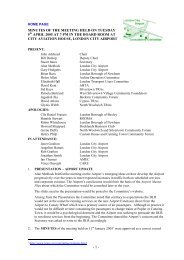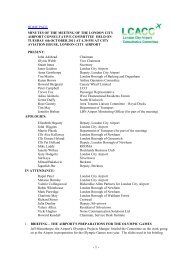The Mayor's Ambient Noise Strategy - Greater London Authority
The Mayor's Ambient Noise Strategy - Greater London Authority
The Mayor's Ambient Noise Strategy - Greater London Authority
You also want an ePaper? Increase the reach of your titles
YUMPU automatically turns print PDFs into web optimized ePapers that Google loves.
202 Mayor of <strong>London</strong><br />
<strong>The</strong> Mayor’s <strong>Ambient</strong> <strong>Noise</strong> <strong>Strategy</strong><br />
Monitoring data will normally be most useful when collected as part of<br />
active and responsive system management, independently verified where<br />
appropriate. Government, regional and local authorities should, where<br />
necessary, have legal sanctions of last resort. Also, however, noise and<br />
vibration impacts are highly dependent on precise local physical<br />
relationships between source and receiver - to a much greater extent than<br />
with many other pollutants. People’s responses are strongly influenced by<br />
local context. <strong>The</strong>se factors mean that many aspects of noise policy are<br />
best built ‘from the ground up’. Issues include management of strategic<br />
roads, but also community plans, design input in development control<br />
negotiations - including in schemes not referred to the Mayor - urban<br />
regeneration, and local traffic management.<br />
5.22 A pro-active approach to improving city soundscapes needs to be<br />
integrated into urban regeneration, transport, housing and parks<br />
management, town planning, urban design, and many other areas of<br />
urban management. Higher density living is likely to be most successful<br />
where noise management is built into urban management, such as<br />
through warden and concierge schemes. Requirements of the European<br />
Environmental <strong>Noise</strong> Directive include preparation of action plans. 15 Work<br />
at the level of detail of neighbourhood planning is most likely to provide<br />
the ‘fine grain’ understanding of a locality which will identify<br />
improvements that genuinely reflect local needs, implemented in ways<br />
that can be sustained.<br />
5.23 Partnership working will be vital to improving <strong>London</strong>’s noise environment<br />
- including with the <strong>London</strong> boroughs and executive agencies, notably the<br />
Environment Agency. During consultation on this strategy, a number of<br />
authorities expressed informal interest in <strong>London</strong>wide working to develop<br />
and share good practice and make best use of scarce resources. Because of<br />
the lack of a dedicated budget for noise mitigation, and no framework of<br />
powers comparable, for example, with air quality management, this<br />
strategy has focused on identifying action using existing instruments. <strong>The</strong><br />
work of Transport for <strong>London</strong> and links with the boroughs, both on<br />
transport and through the planning system, will be key.<br />
policy 88<br />
policy 89<br />
<strong>The</strong> Mayor will urge the Government to provide a framework for action<br />
which integrates noise management at all relevant levels of social,<br />
economic and environmental decision-making, including in strategy and<br />
planning, regulation, enforcement, provision of incentives and investment.<br />
<strong>The</strong> Mayor will work with area-based and other partnerships, boroughs,<br />
and specialist agencies to assess how improved noise management can be<br />
incorporated into their on-going planning and implementation



